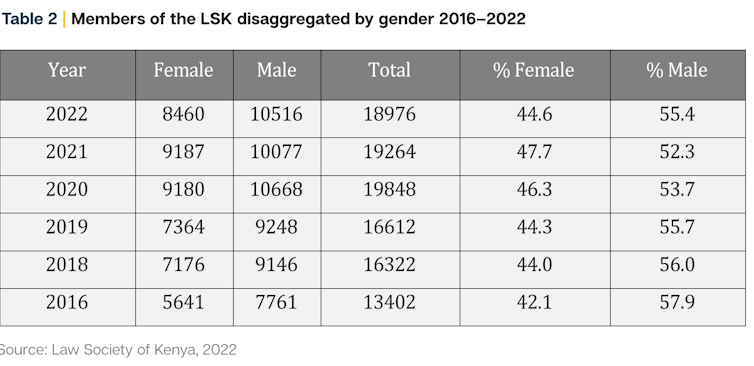
The African continent currently leads the world in the number of women chief justices and presidents of constitutional courts. Several countries across the continent have almost equal numbers of women and men at the bar.
Some countries, such as Cape Verde, Zambia, South Africa, Namibia and Sierra Leone, have had women as presidents of the bar association or law society. In the legal academy, some countries have recorded success with women as deans of law faculties and heads of departments. And across the continent, the number of women called to the bar is increasing each year.
Still, challenges remain, narrowing the opportunity structures for women to lead in some countries. As a lawyer and professor I have authored several books on women in the legal profession in Africa. I am also the founder of the Institute for African Women in Law, an organisation committed to supporting women in law across Africa and the diaspora.
As part of my work, I coordinated a project examining the barriers to women’s leadership in the legal profession in Kenya, Senegal, Nigeria and South Africa.
Findings from the Women in Law and Leadership study show that progress is uneven across the judiciary, bar and academia. The reports show that increases in the number of women will not automatically lead to institutional change. The masculine foundations on which the legal traditions and legal profession were built and continue to operate must be acknowledged and called out.
Raychelle Awuor Omamo, the first (and so far only) woman to chair the Law Society of Kenya, commented on these findings:
This report makes evidence-based rather than anecdotal recommendations … I believe if taken seriously, this report’s recommendations can catapult more women advocates in Kenya to the highest levels possible in the legal profession, both nationally and internationally.
The findings from all four nations show that accelerating women’s equitable leadership in law requires targeted initiatives at the individual, structural, institutional and philanthropic levels. Systems change slowly, but women cannot wait for slow systems. Advancing women in leadership should be a priority for all advocates for human rights, the rule of law, and justice.
Barriers to leadership
The research combined qualitative and quantitative data sources to analyse the research questions. To centre women’s voices in law, we used in‑depth interviews, focus groups and key informant discussions.
We found that 60% of respondents at the bar in Kenya attributed their career stagnation to gender stereotypes. There is a view that women’s caregiving roles as wives and mothers reduce their productivity.
In Nigeria, similar sentiments were expressed. Over 70% of respondents pointed to sexual harassment and unequal pay as factors affecting their professional advancement.
In South Africa, lingering racialised perceptions of black women as “incompetent” continue to restrict their upward mobility at the bar.
In Senegal, historical, cultural and religious expectations of women’s societal roles have kept women out of the legal professions or held them back. The high levels of attrition from the legal pipeline occur at the university level with girls choosing marriage over career.
These challenges are real and dotted along the entire career journey. In endorsing the reports, the first woman deputy chief justice of South Africa, Mandisa Maya, shared her experience:
As a woman on the bench, I encountered my own barriers in rising to where I am today. But those barriers play out differently for different women and change over time. Therefore, the barriers this report identifies shed light on the old, new and emerging obstacles to women’s retention and promotion.
Overall, data from the reports shows a gradual increase in the number of women in the legal professions in Kenya, Nigeria and South Africa.

In Senegal, men continue to dominate the bar, bench and academia. As of June 2022, of the 418 lawyers registered, only 67 (16%) were women. These numbers may not reflect all lawyers called to the Senegalese bar. Some are trained in France, and most often work in France and other jurisdictions outside Senegal.
Moving forward
The numerical representation of women is not the biggest challenge in most countries. The focus must shift from the numbers to the representation in leadership.
Some analysts make a “business case” for more women in leadership. They argue that gender-diverse companies will bring more clients and increase the bottom line.
I offer a simple counter-argument: women lawyers and women’s rights advocates should not have to make “a case” for women’s representation in leadership positions. There is no shortage of qualified women in the legal professions. What is needed is a shift in systems, institutional practices, norms and perceptions to accommodate more women in leadership positions.
The legal institutional gatekeepers such as bar associations, law societies and law schools must acknowledge women as equal peers and acknowledge their contributions as essential to the survival of the workplace.
At the structural level, the legal sector must change its gender-biased perceptions and stereotypes about women’s work ethic and invest in professional training opportunities to support women’s leadership skills.
At the institutional and organisational levels, the legal sector must create equitable working opportunities. It must provide equal pay for equal work, eradicate gender stereotypes, provide professional training opportunities to support women’s leadership skills as individuals and support women of childbearing age.
Despite the low numbers in leadership, women are acquiring higher education, developing niches in legal practice, branching out to international positions and bringing back the knowledge and experience acquired to support and mentor other women. Systems change is possible if financial investments are directed at supporting women and women‑led organisations across Africa and the African diaspora.
Josephine Jarpa Dawuni works for/consults to Institute for African Women in Law. National Science Foundation grant
This article was originally published on The Conversation. Read the original article.







